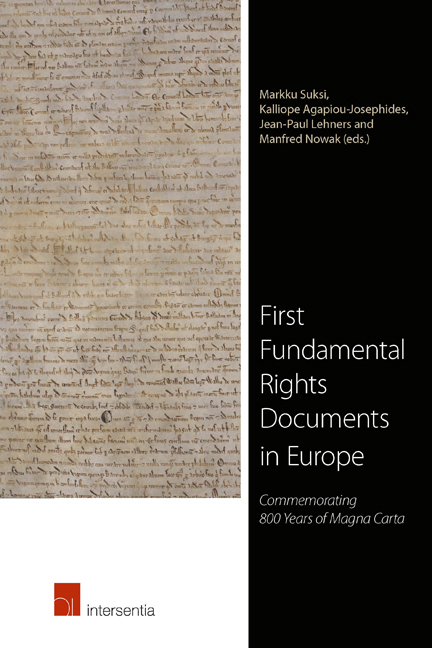Book contents
- Frontmatter
- Preface
- Contents
- List of Authors
- 1 Introduction
- PART I
- PART II
- 11 France: Foundational Importance of the Declaration of 1789
- 12 Sweden: Free Press as a First Fundamental Right
- 13 The Netherlands: The Batavian Staatsregeling as the First Fundamental Rights Document
- 14 Portugal: ‘Tropical Versailles’ in the Beginning of the Nineteenth Century
- 15 Luxembourg: Fundamental Rights in a Small State
- 16 Greece: Reflections from the Hellenic Legal Tradition
- 17 Denmark: In Love with Tradition
- 18 Germany: Fundamental Rights as an Instrument Towards the Rechtstaat
- 19 The Czech Republic: On the Road to Rights and Freedoms
- 20 Romania: The Birth of Fundamental Rights as a Form of Political Contention
- 21 Bulgaria: The Liberal Tarnovo Constitution
- 22 Finland: Rights to Facilitate Participation
- 23 Estonia: First Landmarks of Fundamental Rights
- 24 Slovakia: The Right of a Nation
- 25 Latvia: Second Part of the Constitution as a Project for Next Generations
- 26 The History of Fundamental Rights in Europe: A Long and Winding Road
- Index
15 - Luxembourg: Fundamental Rights in a Small State
from PART II
Published online by Cambridge University Press: 15 December 2017
- Frontmatter
- Preface
- Contents
- List of Authors
- 1 Introduction
- PART I
- PART II
- 11 France: Foundational Importance of the Declaration of 1789
- 12 Sweden: Free Press as a First Fundamental Right
- 13 The Netherlands: The Batavian Staatsregeling as the First Fundamental Rights Document
- 14 Portugal: ‘Tropical Versailles’ in the Beginning of the Nineteenth Century
- 15 Luxembourg: Fundamental Rights in a Small State
- 16 Greece: Reflections from the Hellenic Legal Tradition
- 17 Denmark: In Love with Tradition
- 18 Germany: Fundamental Rights as an Instrument Towards the Rechtstaat
- 19 The Czech Republic: On the Road to Rights and Freedoms
- 20 Romania: The Birth of Fundamental Rights as a Form of Political Contention
- 21 Bulgaria: The Liberal Tarnovo Constitution
- 22 Finland: Rights to Facilitate Participation
- 23 Estonia: First Landmarks of Fundamental Rights
- 24 Slovakia: The Right of a Nation
- 25 Latvia: Second Part of the Constitution as a Project for Next Generations
- 26 The History of Fundamental Rights in Europe: A Long and Winding Road
- Index
Summary
INTRODUCTION
In the context of constitutional history, Luxembourg is a valuable example of the development of a small state. Although Luxembourg only received a truly independent government in 1839, the creation of the current state is a result of the Congress of Vienna in 1815. In the centuries before 1815, the territory was a legal part of different empires and fell under different constitutional systems. The focus of this analysis will lie on the development of Luxembourg in the nineteenth century, yet we will see that movements in favour of fundamental rights can be identified earlier on a local level during the Middle Ages and throughout the state's development, as various influences interacted with an increasingly emancipated society. The development of Luxembourg from state to nation was triggered by the territory's reorganisation at the Congress of Vienna in 1815 and progressed through the achievement of sovereignty in the years from 1839 to 1868. The latter was the initial catalyst for the development of a national conscience and even a national identity that became increasingly manifest during the political instabilities of 1848 and the developments during the post-March era from 1848 to 1870.
This analysis will focus on the different constitutional systems that Luxembourg was subjected to during the nineteenth century, and special attention will be given to the national Luxembourgish constitutions. The aim is to identify movements in favour of fundamental rights — such as ideas of liberty, equality, solidarity, inclusion or justice — in the different documents of a constitutional nature. The partition of power will also be considered — especially the interplay between the ranges of influence of the monarch, the government and the representative bodies — as well as the possibilities for political participation of representative organs. The development of the administration in the years of the achievement of state sovereignty will also be briefly addressed, along with suffrage and the gender question.
HISTORICAL CONTEXT
The political history of the territory that we now call Luxembourg is a complex one, starting well before the actual territorial configuration in 1839. While the Grand Duchy was created during the Congress of Vienna in 1815, the major part of its territory is constituted of the former county of Luxembourg that had become a Duchy in the fourteenth century and was the ancestral homeland of the Luxembourg dynasty that counted several emperors.
- Type
- Chapter
- Information
- First Fundamental Rights Documents in EuropeCommemorating 800 Years of Magna Carta, pp. 185 - 196Publisher: IntersentiaPrint publication year: 2015



